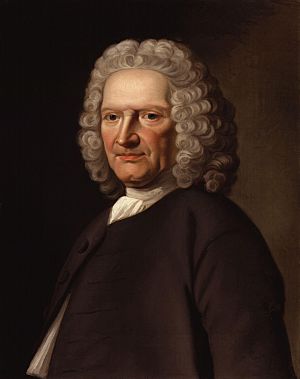John Ward (academic) facts for kids
John Ward (born around 1679, died 1758) was an English teacher and writer. He was known for supporting groups that studied different subjects. He also wrote about the professors at Gresham College, where he himself taught.
Life of John Ward
John Ward was born in London around 1679. His father, also named John Ward, was a minister. For some years, John Ward worked as a clerk in the navy office. In his free time, he studied with the help of John Ker, who ran a school.
In 1710, Ward left the navy office. He then opened his own school in Tenter Alley, Moorfields, which he ran for many years.

Joining Learned Societies
In 1712, Ward became one of the first members of a special group. This group was made up of religious leaders and lawyers. They met regularly to discuss laws and the rules of nature.
On September 1, 1720, John Ward was chosen to be the Gresham Professor of Rhetoric. This was a teaching position at Gresham College.
Ward was also elected as a Fellow of the Royal Society on November 30, 1723. The Royal Society is a famous group that promotes science. He was often part of their council and became a vice-president in 1752.
In 1733, he traveled through Holland, Flanders, and Paris. On February 5, 1736, he became a Fellow of the Society of Antiquaries. This society studies old things and history. He later became a director and then a vice-president of this group.
Supporting Learning
John Ward also joined another group of important people. This group worked to encourage learning. They helped print books, like an edition of Dissertations by Maximus of Tyre. Ward helped supervise this book. He also helped with De Natura Animalium by Claudius Aelianus.
On May 20, 1751, the University of Edinburgh gave Ward an honorary degree. This meant he was recognized for his great learning. He also became a member of the Gentlemen's Society at Spalding. When the British Museum was created, he was chosen as one of its trustees.
John Ward passed away in his rooms at Gresham College on October 17, 1758. He was buried in Bunhill Fields, a burial ground for people who were not part of the Church of England.
Works by John Ward
John Ward wrote many books and helped with others. Here are some of his important works:
- De ordine, sive de venusta et eleganti tum vocabulorum, tum membrorum sententiæ collocatione, London, 1712. This book was about the order and arrangement of words and sentences.
- De Asse et partibus ejus commentarius, London, 1719. This was a book about ancient Roman money.
- Ad Con. Middletoni de medicorum apud veteres Romanos degentium conditione dissertationem, quæ servilem atque ignobilem eam fuisse contendit, responsio, London [February 1726–7]. This was part of a debate about the status of doctors in ancient Rome.
- The Lives of the Professors of Gresham College, to which is prefixed the Life of the Founder, Sir Thomas Gresham, London, 1740. This is one of his most famous works, where he wrote about the teachers at Gresham College.
- Four Essays upon the English Language, London, 1758. These essays explored different aspects of the English language.
- A System of Oratory, delivered in a course of lectures publickly read at Gresham College, London, London, 1759, 2 vols. This book came from his lectures on public speaking at Gresham College.
- Dissertations upon several Passages of the Sacred Scriptures, London, 1761. These were discussions on different parts of the Bible.
Ward also helped with many other publications. He assisted with Jacques Auguste de Thou's History (1728) and Robert Ainsworth's Latin Dictionary. He also helped with the works of George Benson and Martin Folkes's book on English gold coins. He translated Richard Mead's Discourse of the Plague into Latin in 1723. He also edited William Lily's Latin Grammar in 1732. John Ward wrote many papers for the Philosophical Transactions, a scientific journal.
 | William Lucy |
 | Charles Hayes |
 | Cleveland Robinson |

